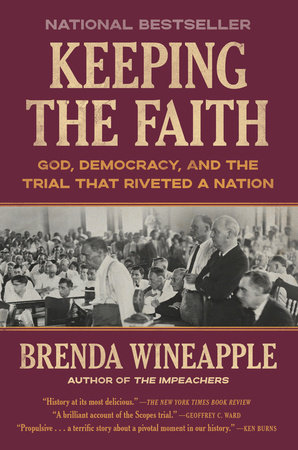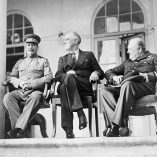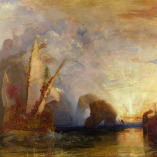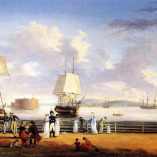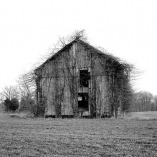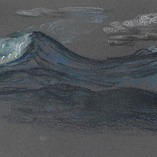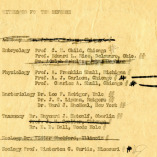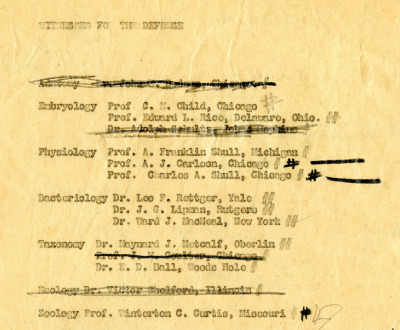
Illustration: Detail from “Witnesses for the Defense in the Scopes Trial 1925.” Smithsonian Institution Archives.
“Religion gives people certainty and it gives people solace,” says Brenda Wineapple in this week’s episode of The World in Time. “And according to William Jennings Bryan, it gives you a moral center, which would make impossible the cruelties of, say, World War One, which horrified him. But that kind of intolerable meaninglessness is something Clarence Darrow, too, feels so strongly. He said, and I’m paraphrasing: everybody needs their dope, whatever it is, whether it’s the church or whether it’s drugs or whether it’s sex. He’s open-minded about that. He’s basically saying life is hard. Life is very hard. There are a lot of things we don’t understand. Whatever makes you feel better. One of the poignancies of Darrow’s life is that it was hard for him to feel better. He wanted people to feel better. There was so much cruelty in the world. I wonder if, in his heart of hearts, Bryan also couldn’t stand that meaninglessness.”
This week on the podcast, Donovan Hohn speaks with Brenda Wineapple, longtime member of the Lapham’s Quarterly editorial board, about her new book, Keeping the Faith: God, Democracy, and the Trial that Riveted a Nation, which narrates and excavates the history of The State of Tennessee v. John Thomas Scopes. That case, tried and adjudicated in 1925, was, in Wineapple’s estimation, the “trial of the century,” pitting Clarence Darrow, the renowned labor lawyer, against William Jennings Bryan, the “boy orator” and three-time Democratic presidential nominee. As Wineapple’s book reveals, many of the conflicts that animated the courtroom drama in Dayton, Tennessee—between democratic majority rule and academic freedom, between the pursuit of scientific truth and the consolations of faith—are with us still, a century after the verdict in the Scopes trial was delivered.
WORKS CITED
(In order of mention.)
Jerome Lawrence and Robert E. Lee. Inherit the Wind. New York: Ballantine Books, 2007.
Stanley Kramer, director. Inherit the Wind. United Artists, 1960.
Brenda Wineapple. Keeping the Faith: God, Democracy, and the Trial That Riveted a Nation. New York: Random House, 2024.
Brenda Wineapple. White Heat: The Friendship of Emily Dickinson and Thomas Wentworth Higginson. New York: Anchor Books, 2009.
Brenda Wineapple. Ecstatic Nation: Confidence, Crisis, and Compromise, 1848-1877. New York: Harper Perennial, 2014.
Nathaniel Hawthorne. The Scarlet Letter. Foreword by Tom Perrotta and introduced by Robert Milder. New York: Penguin Classics, 2015.
Brenda Wineapple. Hawthorne: A Life. New York: Random House Trade, 2004.
Brenda Wineapple. The Impeachers: The Trial of Andrew Johnson and the Dream of a Just Nation. New York: Random House Trade, 2020.
Lewis H. Lapham. “Brenda Wineapple.” The World in Time from Lapham's Quarterly, May 31, 2019.
Charles Darwin. On the Origin of Species. Edited by Gillian Beer. Oxford: Oxford University Press, 2009.
William Jennings Bryan. “Hear William Jennings Bryan Deliver His ‘Cross of Gold’ Speech at the Democratic National Convention.” Audio Recording, July 8, 1896. Britannica.com.
“Public Law 68-139: An act to limit the immigration of aliens into the United States, and for other purposes,” May 26, 1924. National Archives.
“Public Acts, 1925, Chapter 27. The Butler Act,” March 21, 1925. Tennessee Virtual Archive.
George William Hunter. A Civic Biology: Presented in Problems. New York: American Book Company, 1914.
“Alien and Sedition Acts (1798).” National Archives.
“Bryan Sets True Loyalty Example.” Bainbridge Post-Search Light, August 30, 1917. Georgia Historic Newspapers.
William Jennings Bryan. The Menace of Darwinism. New York: Fleming H. Revell Company, 1922.
H.L. Mencken. The American Language. Second edition. Claremont, CA: Coyote Canyon Press, 2012.
Richard Sennett and Jonathan Cobb. The Hidden Injuries of Class. New York: W.W. Norton & Company, 1993.
Madison Grant. The Passing of the Great Race: Or, The Racial Basis of European History. New York: Charles Scribner’s Sons, 1916.
F. Scott Fitzgerald. The Great Gatsby. Introduced by Jesmyn Ward. New York: Pocket Books, 2020.
Book of Genesis. In The Bible: Authorized King James Version with Apocrypha. Edited by Robert Carroll and Stephen Prickett. Oxford: Oxford University Press, 2008.
“Law is ‘Horrible’ Says Darrow, 79. And ‘There Is No Such Things as Justice in or Out of Court,’ He Asserts. Says He Is Idealistic. Man Does His Best Work From 40 to 50, Before He Softens, Lawyer Remarks,” The Associated Press, April 19, 1936.
Book of 2 Timothy. In The Bible: Authorized King James Version with Apocrypha. Edited by Robert Carroll and Stephen Prickett. Oxford: Oxford University Press, 2009.
Clarence Darrow. The Essential Words and Writings of Clarence Darrow. Edited by Edward J. Larson and introduced by Jack Marshall. New York: Modern Library, 2007.
